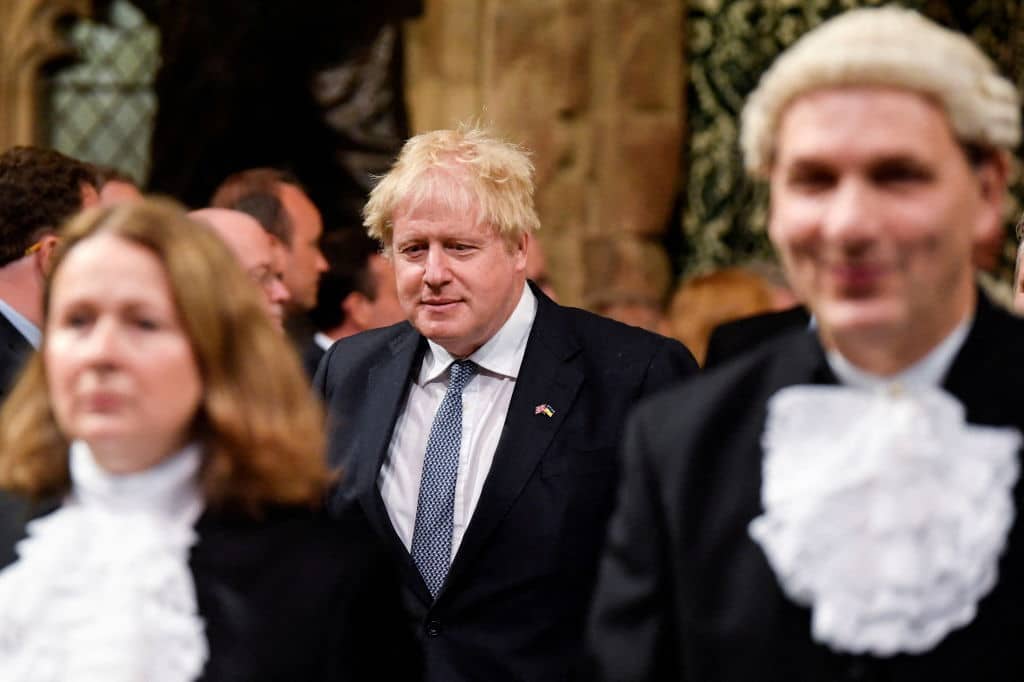It’s rarely a good sign when, moments after a major set piece event such as yesterday’s Queen’s Speech, the government’s PR machine kicks into overdrive to defend it.
Though Labour’s claims that Boris Johnson isn’t doing enough to support squeezed households were wearyingly predictable, the Tory narrative about turbocharging the economy and slashing EU red tape has quickly fizzled out. And Michael Gove’s surreal media performance this morning won’t do much to allay concerns that Boris’s government is up a creek without a paddle.
Brits are currently facing rising energy bills, inflation is forecast to hit ten per cent and wages are failing to keep up with the increase in prices. But while demands for politicians to ‘do more’ are gathering steam, the government has been achieving the opposite. As one Westminster think tanker pointed out yesterday: ‘the only growth the government is achieving is the growth of the state’.
The Queen’s Speech wasn’t all bad
The Queen’s Speech saw the announcement of 38 new bills. More than 3,000 statutory instruments – also known as secondary legislation – are being introduced each year. A few weeks ago, Conservative MPs were proudly sharing a Twitter card declaring the government was ‘getting on with the job’ because 19 acts had received Royal Assent. But what ‘job’ was it ‘getting on with’ when it introduced the Glue Traps (Offences) Act to ban the use of ‘inhumane’ traps for rodent control?
These laws may be introduced with good intentions, usually to the delight of interested groups and the ambivalence of the wider public. But we now find ourselves in a regulatory rachet, with politicians who define success by the number of new rules they can conjure up to limit ordinary citizens’ room for manoeuvre and expand the reach of the state.
It also leads to muddled thinking. Yesterday saw the introduction of a Bill of Rights to ‘enshrined freedom of speech,’ yet government also pressed ahead with an Online Safety Bill that will censor it. The continued inclusion of ‘legal but harmful’ speech in the latter bill could force Big Tech to clamp down on views that would be acceptable offline. New communications offences could force platforms to remove speech merely on the suspicion that it could cause psychological harm.
The Prime Minister insisted that government would ‘help families up and down the country’ with financial hardships, yet by extending the energy price cap, suppressing competition and picking winners it will commit households to higher energy costs for years to come. To make maters worse, there was no mention yesterday during the stream of announcements of childcare deregulation to help bring down sky-high costs for working parents.
Most disappointingly, references to planning reform concerned themselves with relatively minor and trivial issues rather than representing the ‘radical shakeup’ Boris Johnson had promised. Once again, the government has capitulated to NIMBY interests, giving credence to the idea that while the news cycle is ever-evolving there is one iron law of British politics that will never change: NIMBYs always win. Britain is still building fewer new homes per 100,000 people than comparable countries, a failure that exacerbates the cost of living crisis more than any other.
The Queen’s Speech wasn’t all bad. A Brexit Freedoms Bill will allow for the systematic reviewing and possible repealing of retained EU law. This is a necessary step towards reforming our regulatory environment. Reforms to data protection laws could be transformative. The proposed ban on buy-one-get-one-free deals on ‘junk food’ has been abandoned, though new advertising rules on ‘unhealthy’ foods appear to be going ahead.
Nothing was more welcome than the omission of measures in the Speech to further tilt the balance against employers: these haven’t been properly discussed and are likely to bring unintended consequences for jobs and pay. But the decision was met with fierce opposition from unions and HR professionals. Responding to the absence of an Employment Bill in yesterday’s Speech, the TUC’s Frances O’Grady claimed that ministers had ‘sent a signal that they are happy for rogue employers to ride roughshod over workers’ rights’. Apparently, ‘bad bosses’ will be ‘celebrating’. The reality is rather different: this is good news for businesses that are creating jobs in an uncertain economic climate.
The idea of controlling citizens is as old as government. But the notion of regulating citizens and markets is relatively recent. In Britain, this is done alarmingly effectively through the Equality Act and increase in labour market regulation. The number of Diversity & Inclusion roles surged 71 per cent between 2015 and 2020. According to LinkedIn, we now have twice as many D&I workers per capita as any other country. And the cost is huge, as businesses hire more and more HR workers to keep the wolf from lawyers’ doors.
Cuts in regulatory costs are as important as reductions in taxes, potentially freeing up tens of billions of pounds in resources for more productive use. The trouble is, politicians are being constantly pushed towards paternalism, with vested interests setting some utopian benchmark around the optimal activities of certain groups. But it is not utopian to risk driving up food prices in the name of ‘childhood obesity’, or compel businesses to pay workers more regardless of whether they can afford it. Nor is it moral to regulate the greatest tool for free speech yet created: the internet. Resistance might not be easy, but it is necessary.






Comments